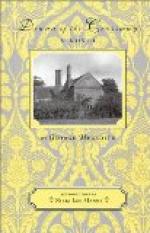Of the Irish priest (and she was not of his retinue), when he was deemed a revolutionary, Henry Wilmers notes her saying: ’Be in tune with him; he is in the key-note for harmony. He is shepherd, doctor, nurse, comforter, anecdotist and fun-maker to his poor flock; and you wonder they see the burning gateway of their heaven in him? Conciliate the priest.’
It has been partly done, done late, when the poor flock have found their doctoring and shepherding at other hands: their ‘bulb-food and fiddle,’ that she petitioned for, to keep them from a complete shaving off their patch of bog and scrub soil, without any perception of the tremulous transatlantic magnification of the fiddle, and the splitting discord of its latest inspiriting jig.
And she will not have the consequences of the ’weariful old Irish duel between Honour and Hunger judged by bread and butter juries.’
She had need to be beautiful to be tolerable in days when Englishmen stood more openly for the strong arm to maintain the Union. Her troop of enemies was of her summoning.
Ordinarily her topics were of wider range, and those of a woman who mixed hearing with reading, and observation with her musings. She has no doleful ejaculatory notes, of the kind peculiar to women at war, containing one-third of speculative substance to two of sentimental—a feminine plea for comprehension and a squire; and it was probably the reason (as there is no reason to suppose an emotional cause) why she exercised her evident sway over the mind of so plain and straightforward an Englishman as Henry Wilmers. She told him that she read rapidly, ’a great deal at one gulp,’ and thought in flashes—a way with the makers of phrases. She wrote, she confessed, laboriously. The desire to prune, compress, overcharge, was a torment to the nervous woman writing under a sharp necessity for payment. Her songs were shot off on the impulsion; prose was the heavy task. ‘To be pointedly rational,’ she said, ’is a greater difficulty for me than a fine delirium.’ She did not talk as if it would have been so, he remarks. One is not astonished at her appearing an ‘actress’ to the flat-minded. But the basis of her woman’s nature was pointed flame: In the fulness of her history we perceive nothing histrionic. Capricious or enthusiastic in her youth, she never trifled with feeling; and if she did so with some showy phrases and occasionally proffered commonplaces in gilt, as she was much excited to do, her moods of reflection were direct, always large and honest, universal as well as feminine.
Her saying that ’A woman in the pillory restores the original bark of brotherhood to mankind,’ is no more than a cry of personal anguish. She has golden apples in her apron. She says of life: ’When I fail to cherish it in every fibre the fires within are waning,’ and that drives like rain to the roots. She says of the world, generously, if with tapering idea: ’From the point of vision of the angels, this ugly monster, only half out of slime, must appear our one constant hero.’ It can be read maliciously, but abstain.




